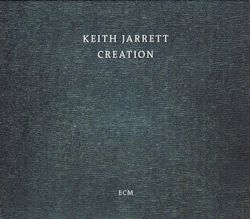-
Part I (Toronto)
-
Part II (Tokyo)
-
Part III (Paris)
-
Part IV (Rome)
-
Part V (Tokyo)
-
Part VI (Tokyo)
-
Part VII (Rome)
-
Part VIII (Rome)
-
Part IX (Tokyo)
Keith Jarrett – Piano
The ECM label have been exemplary in bringing to lovers of jazz much of the oeuvre of Keith Jarrett, revisiting the back catalogue as well as
presenting new expressions of the legendary pianist's work at regular intervals. In May of this year, Jarrett turned 70 and, to mark the occasion,
this selection of music from Jarrett's improvised solo concerts, recorded during 2014 variously in Japan, Canada and Europe, has been issued. The
choice of material belongs to the maestro alone. As with his 2011 solo recording Rio the tracks are identified by part numbers only,
suggesting that a certain continuity of theme is being sought. In the listing above, the locations of the concerts are given in brackets. More
detailed information regarding the venues are provided in the liner notes. Jarrett's involvement with solo concerts goes back as far as 1973 and
his European tour of that year. Now, however, in contrast with performances of this kind undertaken in the past, where his extended improvisations
might last for a half to three quarters of an hour each, here no track is longer than nine and a half minutes. This is not to say that his powers
have in any way diminished. His powers of invention and consummate musicianship still excite the listener.
The Tokyo extemporisations spoke most to me. Part II, for example, reminds me of that delicacy of touch evident whenever Jarrett plays
ballads. Part V is superb - a measured, haunting melody with just enough of that gospel flavour that is a Jarrett hallmark. Part VI, the longest track on the album, moves from a pensive beginning into a progressively developing and spacious theme, coherently and
confidently performed. Part IX shows Jarrett at his most reflective and lyrical. Part IV, recorded in Rome, reveals a questing
and exploratory spirit. This finds powerful expression in parts but also has moments of transcendent beauty. It is, however, intricate and repays
careful attention. Part III, the only track recorded in Paris, is romantic, a little sad but nonetheless lovely. For the rest, there are
always things to admire. The way Part VII conjures up the image of a river in full spate would be one instance, but there occasional
longueurs. The question can arise as to how much jazz feeling is communicated on this particular disc, while accepting that this is music 'on the
hoof' and certainly meets the improvisation criteria. Among his many attributes, Keith Jarrett is a distinguished classical musician and it is that
element that predominates here. It makes for an interesting comparison to listen to the previously mentioned Rio
recording and to note the contrast in mood. Still, as a long-time admirer of Jarrett, I'll grab any opportunity that comes to hear his music and
I'm sure there'll be many takers for this insight into a creative genius at work.
James Poore
